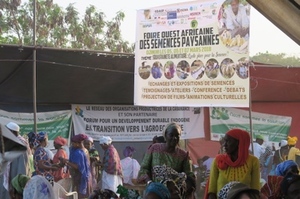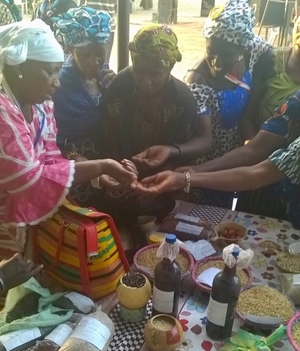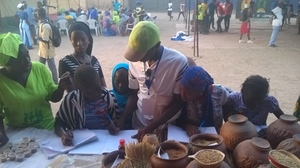We, members of the West African Peasant Seed Committee (COASP), peasants, representatives of peasant organizations, civil society, national and international research institutes from eight West African countries and three European countries, gathered from 5-7 March 2018 for the 6th West African Peasant Seed Fair of Djimini.
We were nearly 500 people who, during our sessions of exchange of information and knowledge of farming practices and seeds, reaffirmed the importance and urgency of recognizing and strengthening peasant seed systems, fundamental for peasant agroecology, guaranteeing our food sovereignty.
Our peasant seeds have enormous potential to provide African populations with the products they need to feed themselves, in sufficient quantity and quality. They are adapted to the changing environment, the salinity of the land, water stress, and contribute to the cultural expression of the communities that make our continent so rich and beautiful.
Throughout history and up to today African farmers have been able to select and multiply a diversity of plants and animals, and share the related knowledge.
Today, we are led to believe that farmers' seeds are of poor quality and that we have no knowledge or know-how in the field of seeds. We are led to believe that to solve the problems of hunger in the world, we must manipulate seeds, create hybrids, desecrate the living to obtain varieties that are more productive or enriched with vitamins. We are also led to believe that our farmer seeds are ‘informal’ and are thus marginalized in our legislation. But experience and the reality on the ground show that this productivist option is an uncertain and dangerous path that leads to poverty.
Indeed we note that:
- Despite billions of CFA francs devoted to promoting commercial seeds, peasant seeds still occupy the majority of cultivated fields in West Africa;
- Peasant seed systems based on agroecology strengthen environmental services including soil fertility;
- Agroecological farming can double yields in a few years, reduce the effects of climate change and cool the planet;
- Peasant seeds and agroecology strengthen the health and autonomy of our countries’ populations.
Thus, we ask West African governments:
- To abandon all activities favourable to the development of industrial agriculture destructive of peasant agriculture and which spreads pesticides and non reproducible seeds;
- To abandon all activities supporting the introduction of GMO seeds or seeds derived from new biotechnologies (e.g. gene editing, gene silencing);
- To abandon any activity of appropriation of the living by intellectual property rights on peasant seeds because they are contrary to our customs;
- To recognize and protect our peasant seed systems and the collective rights of peasants over their seeds in national and sub‐regional legislation;
- To defend, within the ITPGRFA [International Treaty on Plant Genetic Resources for Food and Agriculture], the proposals of farmers' organizations for the recognition and implementation of farmers' rights;
- To create mechanisms to ensure transparency and participation in decision-making, including for women and young people.
- To support peasant initiatives for the promotion of peasant agroecology and seeds: seed banks, seed fairs and all other initiatives in favour of peasant seeds;
- To encourage training spaces, knowledge sharing, and alliances for the co‐creation of knowledge.
Djimini, 7 March 2018.


